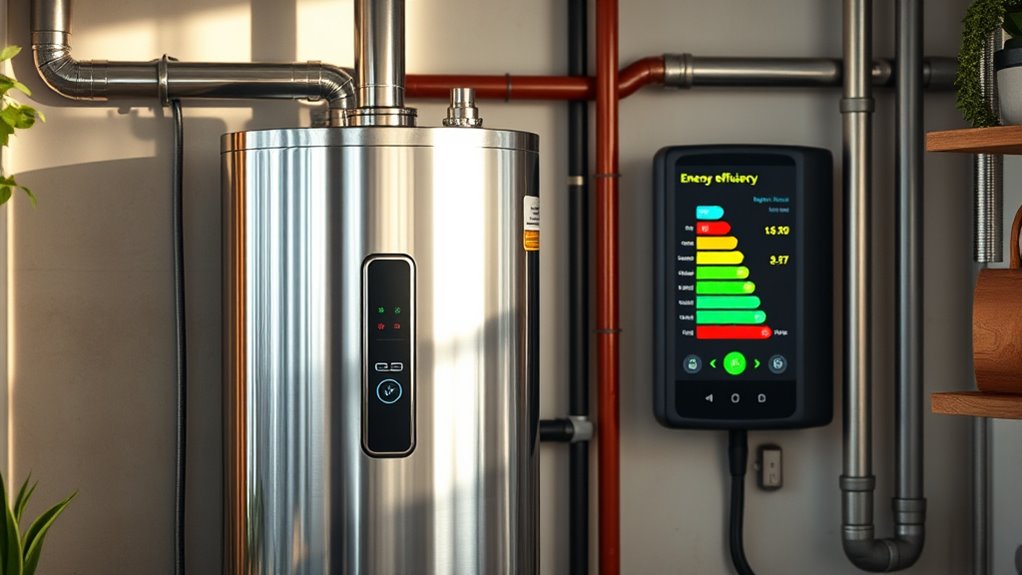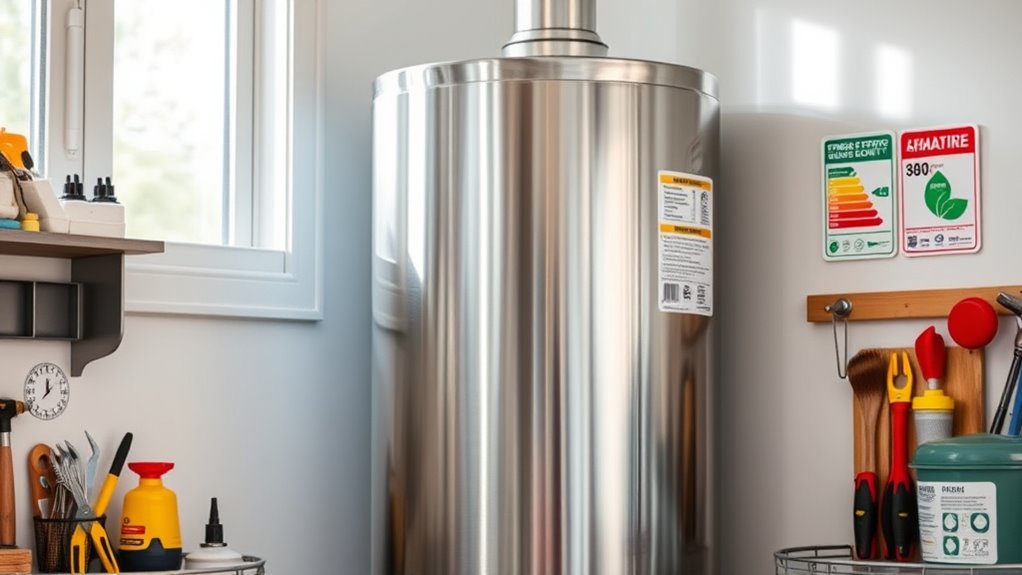Boosting your water heater’s efficiency doesn’t need to break the bank. For tight budgets, simple steps like lowering the temperature, insulating pipes, and running appliances only with full loads help a lot. Upgrading to a newer, ENERGY STAR-rated model or switching to a tankless system can save more long-term, though they cost more upfront. Using timers or smart controls guarantees your heater isn’t working when you don’t need it. Keep exploring to discover more cost-effective ways to optimize your hot water system.
Key Takeaways
- Upgrading to ENERGY STAR-rated models improves efficiency across all budgets.
- Proper insulation and regular maintenance help maximize existing water heater performance affordably.
- Installing timers or smart controls can reduce energy waste without significant expense.
- Tankless water heaters offer long-term savings despite higher upfront costs; choose based on your needs and budget.
- Maintaining optimal temperature settings and running full loads conserve hot water and lower energy bills.

Are you getting the most out of your water heater? If not, it’s time to consider how you can improve its efficiency without breaking the bank. Water heaters are essential, but they can also be costly to operate if they aren’t running at their best. Whether you have a tight budget or are willing to invest more for advanced features, there are ways to make your water heater work smarter and save you money in the long run.
First, check the age of your unit. Older water heaters, especially those over 10-15 years, tend to be less efficient due to wear and outdated technology. If yours is nearing the end of its lifespan, replacing it with a newer, ENERGY STAR-rated model can considerably cut your energy bills. These models use advanced insulation and heating elements to minimize heat loss, ensuring you get hot water without wasting energy. If replacing isn’t an option right now, regular maintenance, like flushing out sediment buildup, can keep your current unit running more efficiently. Sediment can insulate the water from the heating element, forcing your heater to work harder and use more energy.
Older water heaters over 10-15 years are less efficient; upgrading or regular maintenance can boost performance and save energy.
Next, think about setting your thermostat to a lower temperature. Many households keep their water heater set at 140°F, but lowering it to 120°F can save energy and reduce risks of scalding. It’s a simple adjustment that doesn’t compromise comfort for most users. Insulating your water heater and the accessible hot water pipes can also make a noticeable difference. Insulation helps retain heat, reducing standby heat loss and lowering energy costs, especially in colder climates or uninsulated spaces.
For those on a tight budget, investing in a timer or smart control system might seem like an extra expense, but it can pay off. These devices turn off the heater during times when hot water isn’t needed, preventing unnecessary energy use. For example, setting your water heater to turn off during late-night hours or when you’re away can make a difference. If upgrading isn’t feasible, simply being mindful of hot water use—taking shorter showers, fixing leaks, and only running your dishwasher or laundry with full loads—also helps.
Additionally, exploring different water heater types can help you choose a more efficient model suited to your needs. For instance, tankless models heat water on demand and don’t store hot water, which can lead to lower energy bills over time. Although they might have a higher upfront cost, the savings on energy and the convenience of endless hot water can justify the investment. No matter your budget, small adjustments and informed choices can optimize your water heater’s efficiency, saving you money and energy in the long run.
Frequently Asked Questions
How Often Should I Flush My Water Heater for Optimal Efficiency?
You should flush your water heater at least once a year to maintain peak efficiency. If you notice reduced hot water flow or sediment buildup, consider flushing it more often, around every six months. Regular flushing removes mineral buildup and sediment, helping your heater run smoothly and saving energy. Always follow your manufacturer’s instructions or consult a professional if you’re unsure how to safely perform the flush.
Are Tankless Water Heaters More Energy-Efficient Than Traditional Models?
Tankless water heaters are generally more energy-efficient than traditional models, saving you up to 30% on energy costs. They heat water on demand, so you don’t waste energy maintaining a tank’s temperature when not in use. This efficiency means lower utility bills and a smaller carbon footprint. If you want an eco-friendly option that reduces energy consumption, a tankless system could be a smart choice for your home.
What Maintenance Tasks Can Improve My Water Heater’s Efficiency?
You can boost your water heater’s efficiency by regularly flushing out sediment buildup, which improves heating performance. Check the thermostat settings and keep it at an ideal temperature, around 120°F, to save energy. Insulate the tank and pipes to prevent heat loss. Additionally, inspect for leaks, corrosion, or rust, and replace worn parts promptly. Scheduling annual maintenance with a professional can also keep your unit running smoothly and efficiently.
How Does Water Heater Insulation Impact Energy Consumption?
Imagine wrapping your water heater in a cozy blanket, trapping its heat inside. Insulation reduces heat loss, so your heater doesn’t have to work as hard to maintain warm water. This means lower energy consumption and reduced bills. You’ll notice a more efficient system that conserves energy, saves you money, and extends your water heater’s lifespan—all because proper insulation keeps the heat exactly where it should be.
What Are the Signs My Water Heater Is Losing Efficiency?
You might notice your water heater is losing efficiency if it takes longer to heat water, if your energy bills increase unexpectedly, or if the unit makes strange noises. You could also see inconsistent water temperatures or find the tank is leaking. These signs suggest your heater isn’t working as well as it should. Regular maintenance and timely repairs can help restore efficiency and save you money.
Conclusion
Choosing the right water heater is like finding the perfect pair of shoes—you want comfort, efficiency, and a fit that lasts. By understanding your budget and needs, you can make a smart decision that keeps your energy bills in check and your home running smoothly. Remember, investing in the right water heater is like planting a seed—careful choices today will lead to warm, reliable showers tomorrow. Make your choice wisely and enjoy the long-term benefits.









